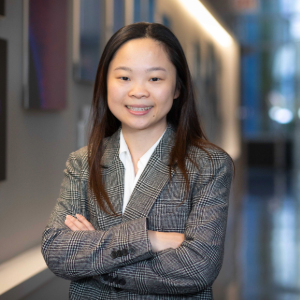
November 2024 Newsletter

November 2024 Newsletter

Student Profile
Szu-Yu Kuan is a PhD student in the Driskill Graduate Program (DGP). In the laboratory of Mee-Ngan F Yap, PhD, associate professor of Microbiology-Immunology, she studies in bacterial pathogenesis, bacterial physiology and ribosomes.
Where is your hometown?
I was born in Taipei, Taiwan and moved to the United States when I was thirteen.
What sparked your interest in science or medicine?
It was an introductory microbiology laboratory class at Penn State that sparked my interest in science. At the beginning of the course, I was given a mysterious microbe to culture and identify. I performed various tests to observe its nutrient utilization and physiological characteristics. Seeing how bacteria behave differently inspired my research interest in this field.
What are your research interests?
My research interests broadly encompass microbial physiology and its adaptation to different environments. Specifically, I focus on ribosomes, which are the essential protein manufacturers in all cells and viruses. I am fascinated by the complex roles ribosome play in cellular survival and function. My goal is to explore how ribosome-associated factors can affect translational processes in staphylococcal biogenesis, pathogenesis and antibiotic resistance. Understanding these mechanisms may reveal new strategies to combat antibiotic-resistant infections.
What are you currently working on?
I am currently investigating the roles of universal stress proteins (Usps) in Staphylococcus aureus. Usps are induced by various stresses and are found in diverse species but not in humans. These proteins are intriguing because bacteria encounter oxidative stress environment imposed by our immune system upon entering a host cell. Some outstanding questions are: what is the function of Usps, what is the underlying mechanism of Usps and how do Usps affect ribosomes.
Please tell us about a defining moment in your education at Feinberg thus far.
I recently attended the Gordon Research Conference on Microbial Stress Response, where I presented my newest research findings to the international scientific community and won a poster award. I received valuable feedback and ideas to further investigate my project. This experience has motivated me to work arduously in the lab and practice articulating my work to the scientific community. I am also grateful to be surrounded by the amazing faculty from the bacteriology community at Feinberg. They not only challenge me to do rigorous research but also prepare me for any kind of opportunity.
What do you hope to do with your degree?
I plan to continue down this path and push the boundaries of knowledge that we know about bacteria further down the road. I hope that my degree can help me to become a better communicator to convey scientific knowledge to the public.